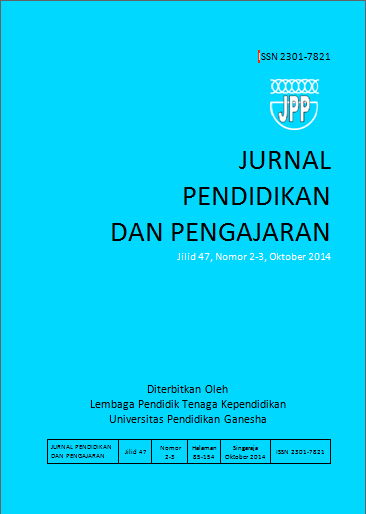Pembelajaran Kooperatif Pola Tematik Berbasis Lesson Study untuk Meningkatkan Hasil Belajar
DOI:
https://doi.org/10.23887/jppundiksha.v47i2-3.4862Abstrak
Penelitian ini bertujuan untuk meningkatkan hasil belajar PKn siswa kelas I SD No 1 Denpasar Barat Tahun ajaran 2012/2013 melalui pembelajaran kooperatif dengan pola tematik berbasis Lesson Study. Penelitian tindakan kelas (PTK) berbasis Lesson Study ini berkolaborasi dengan satu guru model dan tiga guru sejawat sebagai pengamat. Objek penelitian adalah hasil belajar siswa yang mencakup ranah kognitif dan afektif, khususnya sikap religius. Metode pengumpulan data yang digunakan adalah metode tes dan non-tes. Metode tes berupa tes esai, metode non tes berupa metode observasi dan diskusi. Rata-rata hasil belajar aspek kognitif siklus I adalah 62,8 dengan ketuntasan 5,9%, dan rata-rata sikap religius 67,9. Rata-rata hasil belajar aspek kognitif pada siklus II adalah 71,5 dengan ketuntasan 16,3%, dan nilai sikap religius 72,4. Rata-rata hasil belajar aspek kognitif siklus III adalah 78,2 dengan ketuntasan 63,4%, dan nilai sikap religius 82,9. Penerapan pembelajaran kooperative dengan pola tematik berbasis Lesson Study pada pembelajaran SD kelas rendah membutuhkan peran aktif guru dalam memberikan bimbingan dan motivasi.
Kata-kata Kunci: pembelajaran kooperatif, pembelajaran tematik, lesson study
Unduhan
Cara Mengutip
Terbitan
Bagian
Lisensi
Authors who publish with Jurnal Pendidikan dan Pengajaran agree to the following terms:- Authors retain copyright and grant the journal the right of first publication with the work simultaneously licensed under a Creative Commons Attribution License (CC BY-SA 4.0) that allows others to share the work with an acknowledgment of the work's authorship and initial publication in this journal
- Authors are able to enter into separate, additional contractual arrangements for the non-exclusive distribution of the journal's published version of the work (e.g., post it to an institutional repository or publish it in a book), with an acknowledgment of its initial publication in this journal.
- Authors are permitted and encouraged to post their work online (e.g., in institutional repositories or on their website) prior to and during the submission process, as it can lead to productive exchanges, as well as earlier and greater citation of published work. (See The Effect of Open Access)





